- Home
- Gail Godwin
Flora Page 2
Flora Read online
Page 2
I wandered into Nonie’s room, which was on the ground floor, next to mine, and climbed up on her bed. I turned down the spread and buried my face in her pillows. Her smell was markedly fainter than yesterday. The insidious Sunday afternoon light pushed at me through the drawn curtains. Nonie, who could bend time to her purposes, was no longer here to protect me from emptiness. Even when she had closed her door to lie on her three pillows and take her appointed afternoon rest, the connection between us had been maintained. It always felt like she was in there refueling for us all.
Desperate to burrow back to that connection, I ground my face and body into her bedclothes. This time last Sunday she would have been lying here. The sheets had not yet been changed. She had died on Monday, and Mrs. Jones, whose day was Tuesday, had been postponed for a week. Nonie’s black satchel purse presided aloofly from the top of the dresser. Inside was the little vial of nitroglycerin, useless now. “Handsome” languished, unseen on Easter Day, in its hatbox on her closet shelf.
How could she be so here and not here? I tried to make myself cry into her pillows before the smell of her cold cream vanished altogether. If she was gone, what parts of me had she taken with her? The parts she talked to, taught things to, told her stories to, would never again be addressed by her. And yet her way of saying things was all around me, they were inside of me.
All around me was our house, which pulsed with her stories of it. Old One Thousand she called it, because that was its number; it was the last house at the top of Sunset Drive. She and my grandfather and their young son had shared its rooms and porches with the Recoverers, back in the days when it catered to a few well-paying convalescent tuberculars or inebriates, and occasional souls whose nerves weren’t yet up to going back to ordinary life.
If Nonie were still here, lying on her raised pillows on this Sunday afternoon, I would likely be upstairs on the Recoverers’ south porch, reading or daydreaming on the faded horsehair cushions of a chaise longue. Back when Old One Thousand had also been Dr. Anstruther’s Lodge, there was a view of the town below and the ranges of mountains encircling it, but now the view was blocked by a hectic tangle of branches just beginning to leaf out. The Recoverers would sit on this porch playing cards and sharing the news of their latest clean X-rays or sobriety day-counts or sessions with the local psychiatrist until the sun had moved over the roof; then they would gather their things and move over to the west porch. They were all just figments now, the real people departed long before I was born, but Nonie had told me about them and also about the grandfather I hadn’t known, Doctor Cam, a man thirty years older than herself. How she as an eighteen-year-old girl had been walking to town carrying her valise, running away from the farm and her greedy new stepmother and menacing stepbrother, when this man had reined in his horse and called down in a low-country accent from his cabriolet: “Young lady, can I carry you somewhere?”
“It was a turn of phrase South Carolinians used, but I’d never heard it before. A cabriolet? It was a small, two-wheeled buggy with a retractable hood. The hood was down, so I could get a good look at him before I decided whether to get in. He more than passed inspection—he had a neat gray mustache and nice clothes and was old enough to be my father, if I had been lucky enough to have such an elegant one—so I climbed aboard. While we were settling my valise in the little space in front of my feet, he asked where I was wanting to go and I said, ‘Today I’m only traveling as far as the Battery Hill Hotel, so anywhere you let me off in town will be fine.’ I had prepared this answer in case I was offered a ride. The Battery Hill was the best hotel, and I was hoping to get work there as a maid or laundress, but I wanted to convey the impression I was staying there as a guest waiting for a train the next morning. He said it would be no trouble to take me to the hotel, and then started right in giving information about himself, the way thoughtful people do when they want to put you at your ease. He was a physician and a widower from Columbia, South Carolina. His wife had died of TB in a sanitorium here, and he had fallen in love with the pure air of the mountains and decided to stay on and establish a home for convalescents who were out of danger but still needed rest and care. This morning he had gone to an estate auction in the country and had been lucky enough to acquire some useful items, including a twelve-gallon ice cream freezer, which he was having delivered. It was the same estate sale my father and stepmother and odious stepbrother had gone off to that morning, which had given me my opportunity to escape. I remember sitting in that cabriolet taking me further and further away from the farm and recalling Elise telling my father that very morning she was going to come home with that ice cream freezer if it was the last thing she did. It made me smile, and the doctor noticed it and looked at me so kindly that I almost told him the truth right then. But I thought better of it. It’s best to keep yourself to yourself—especially when you are running away. So I just smiled and kept silent. Oh, I can still see that horse’s sleek rump rotating in the sunshine, and I can smell the leather from the reins in the doctor’s hands and the masculine scent of the toiletry he wore. It was a beautiful May morning and everything was starting to bloom. Before he let me off at the Battery Hill Hotel he gave me his card and said he sincerely hoped I’d get in touch if he could be of further assistance. The card had his Columbia address scored through and he’d written below in a fine copperplate hand: Anstruther’s Lodge, Cameron Anstruther, M.D., Director, and the local address.
“That was the first Anstruther’s Lodge; it was right in town. We bought this house on Sunset Mountain when Harry was going on ten and people had cars. I’ll take you past the old lodge if you like, but do keep in mind it was in a better part of town in those days and looked a lot nicer than it does now.
“I got a job as a laundress at the hotel until they found out I could cook and promoted me to the kitchen. But then my father tracked me down and sent my stepbrother, Earl Quarles, to bring me home. Earl made a scene at the hotel. But I had things to hold over him, and I told him if I was forced to go back to the farm I would see that my father was informed of those things and Earl would be out on his ear.
“What things? Oh, darling, Earl had so many bad traits it would be hard to single one out for you. Let’s just say he was sneaky and bullying and thought nothing of taking what wasn’t his. He had his eye on that farm from the beginning. I don’t know what lies he told them when he returned without me, but Father didn’t send him back again.”
“Didn’t you and your father ever make up?”
“No, darling, we never did. Fate was unkind in that regard. After I had Harry, I was planning to go out and see Father and show him his grandson. And then I opened the paper one morning and saw his obituary. He was only fifty-two but had died of a massive heart attack. The obituary was in the paper from several days back so I couldn’t even go to his funeral. But I’m getting way ahead of myself.
“Earl’s scene at the hotel had cost me my job. It was not the kind of hotel where visitors of employees were allowed to threaten and scream. It was then that I remembered the doctor and called on him at his lodge. It was only a few minutes’ walk from the hotel. I started cooking for his convalescents and ran the household for him. Until one day he asked me if he was too old for me to love, and I gave him a good long look and said, ‘No, you are exactly right.’”
NONIE WAS A born storyteller. It is not so remarkable that I have made a life and a living from storytelling. But there were dangers and drawbacks in her ways of telling and her ways of not telling. Gradually I have come to wonder how deeply her methods have infiltrated mine.
III.
Flora had three interviews for primary school teaching jobs in Alabama and couldn’t come to us until the second week in June, but my father was to report for work on June first. He had his gas coupons and four new tires from the Ration Board for his second summer at Oak Ridge, where he was being promoted to paymaster for a big new complex under construction, and made no secret about his impatience to leave. He’d much rather be o
utdoors supervising an important project for the war effort, he said, than kowtowing to small-town faculty egos. He had been the principal of Mountain City High since I was born, but loved to grumble that carpentry and construction work was his true calling, which had been thwarted by the social expectations of others.
Also—and he couldn’t stop reminding me of this—Oak Ridge would be a healthful change of pace for him because no alcohol was allowed on the premises.
I was as willing for him to go as he was chafing to be gone. Nonie’s removal had altered things between us. The “put-upon” note in his voice, which Nonie had her ways of quelling, was now directed at me, who only seemed to exacerbate it.
I had not known how wobbly things were at Old One Thousand. I barely knew what a mortgage was. Hitler had committed suicide in his Berlin bunker, and the European part of the war had ended in early May, which was supposed to have made everybody happy, except it didn’t. All sorts of qualified young men with talents or important connections would be coming home soon to wrest away jobs from the “old guys” like my father, who was forty-five.
We got on each other’s nerves. One minute he was treating me like a child and then the very next was complaining that something I had said or done was “downright childish.” My worst offense had been at a coffee hour after church. President Roosevelt had died only a few weeks after Nonie, and some people my father didn’t like but who were influential in the community were saying wasn’t it sad that FDR hadn’t lived to see V-E Day. My father stood looking over our heads, encased in his laconic reserve, and I felt that somebody in our family needed to point out that Nonie hadn’t admired FDR all that much.
One evening there was a curse and a thud, and I found my father passed out on the kitchen floor. While I was kneeling over him, wiping the blood from his forehead, I prepared myself to receive fatherly praise for being just where I was needed with the wet cloth. But he cracked open an eye and slurred, “Get the fuck away.”
His June first departure meant I would have to stay with a friend during the week before Flora arrived. I had three friends in fifth grade. My favorite was Annie Rickets, with her wild imagination and her gleeful malice. She speculated outlandishly about what was going on behind the scenes in the lives of people we knew. Both her parents worked for the phone company and, she darkly hinted, had access to equipment that could breach any secret, local or national. Also she was witty about sex. Nonie had provided me with an overview of how things worked, but Annie contributed specific anecdotes garnered from her frank-talking mother and her own salacious speculations. Her gleeful malice occasionally went too far, like when she said my grandmother looked like an upright mastiff driving a car. I found a picture of a mastiff in a dog book and didn’t speak to her for a week. From then on Nonie was off-limits. But Annie shared a walled-in sleeping porch with her two younger sisters and couldn’t have overnight guests.
Then there was Brian Beale, a late-born child who looked like a young prince in an old-fashioned storybook. His father was dead, and his mother, who cochaired the altar guild with Nonie, was raising Brian to be a classic actor. He was taking elocution lessons from an English lady in town to get rid of his mountain twang. Brian and I were allowed to go to afternoon movies by ourselves, and he liked to drawl in his new-fledged British accent, “When we are older, Helen, I shall probably ask for your hand.” Brian had stayed at our house two years before, when his mother had an operation, and when I told him about Flora not being able to come till the second week in June, he said, “You’ll stay with us, of course.” I thanked him and imagined myself already there, though Mrs. Beale was an awful worrier and wouldn’t let us do much. But then Lorena Huff phoned and said she and Rachel were counting on my staying with them. My father left it up to me, and guiltily I chose the Huffs. I lied to Brian that my father thought it was more proper for me to stay with a girl. Rachel Huff, who had moved to town with her mother at the beginning of the war, was less fun than either Annie or Brian. Also she asked rude personal questions and was usually in a grumpy mood from being forced by her mother to excel in so many things. But they had a huge house and a good cook and a pool, and Rachel had twin beds with canopies and her own bathroom and a maid who picked up your discarded clothes. Mr. Huff was up in Washington doing something so important for the war that he could never come home. But he was always sending contraband items like steaks and Hershey’s bars, and Mrs. Huff admired me. She said I was a good influence on Rachel. She was also partial to my father. Nonie had enjoyed teasing him about this.
When he dropped me off for my week’s stay with them, there was Mrs. Huff’s usual cagey flirtation to get through while they had their drinks.
“Tell me, Harry, what are they really making over there in Oak Ridge? One of Huffie’s sources says it’s a new kind of fuel, so the planes can go on longer raids to bomb the Japs.”
“That’s as good an educated guess as any, Lorena, but I can only tell you what I’ll be doing. Overseeing the construction of a new complex and making sure the men on my crew show up for work. I wish I could do that sort of thing all year round. I’m not cut out to be a school administrator.”
“You’d be good at any kind of work you chose, Harry, but I’m a little hurt with you. Helen could have perfectly well stayed with Rachel and me the whole summer. We have everything here. You had no need to import some fancy governess from out of town.”
“Flora is my wife’s first cousin. She’s training to be a teacher, but she’s hardly a fancy governess. I thought it would be better for Helen to stay in her own home. She’s had enough upheaval as it is.”
“Wasn’t she that emotional girl reading your mother’s letters to everyone after the funeral? Well, you know best, but if for some reason it doesn’t work out with Flora, my offer stands.”
“That’s very generous of you, Lorena, but I see no reason why things shouldn’t work out.”
The week with the Huffs turned out to be a torment. Everyone had a schedule but me. Rachel and her mother were on the tennis court before breakfast. I lay in bed hearing their back-and-forth thwocks, interspersed with Lorena Huff’s criticisms and Rachel’s sullen groans. Then the cook started her breakfast sounds, and here came the gardener’s truck rattling up the drive, and after that began the various parcel deliveries, which seemed to go on all day. Ladies arrived to see Lorena Huff, and they sat on the screened porch and tinkled ice and planned charitable events. Twice a week a man came to the house to teach Rachel piano (she was on John Thompson’s book two), and every afternoon at three a mannish woman in jodhpurs drove Rachel away in a jeep for her riding lesson.
“I want you to treat our house like a resort,” Lorena Huff said. “Swim in the pool, have little talks with Rachel, and show up for meals. We’ll take care of the rest. I want you to consider Rachel and me as your family until that cousin of your mother’s gets here.”
Wasn’t it a contradiction in terms for a family member to treat her home as a resort? But what made me far unhappier than my lack of any schedule was the sense that life at Old One Thousand was going on without me. It had a schedule and needed someone there to register it. I did my best to patrol its rooms and porches in spirit. Nonie seemed always to be there waiting, just around a corner or on the other side of a door. Sometimes the Recoverers were there, the ones from her stories, discussing their rates of improvement as the sun passed over the house. Around three o’clock this time of year, as Rachel was being driven away for her riding lesson, they would be gathering up their books and cards and migrating from the south porch to the west porch. And in the background, doing whatever he did in his consulting room (sometimes he wrote poetry: “… ’midst our cloud-begirded peaks / on this December morn / a boy is born,” he had begun his ode on the occasion of my father’s birth), presided the watchful spirit of my grandfather Doctor Cam.
Rachel and I swam and had I-bet-you-can’t-do-this contests in the pool while her mother lay in the sun in her two-piece bathing suit, her skinny br
own midriff baking to a crisp, her face concealed by a picture hat, leafing through magazines and turning down pages when she saw something she wanted. Rachel and I had a thermos of cold lemonade, and Rachel’s mother had her own thermos, which Rachel said was “spiked,” and eventually Lorena Huff would rise from her deck chair, wiggle her fingers at us coyly, and sway unsteadily toward the house.
Every morning, Rachel and I crunched down the sparkling white drive to the mailbox, Rachel toeing up as much gravel as she could, and by the time we had walked back with the mail, Rachel would have gotten in at least two of her embarrassing questions. These ran the gamut from “Which is worse, having your mother or your grandmother die?” to “Don’t you want to know who your father will marry to look after you?”
I grew more desolate as the week went on. I felt I was neglecting an important duty and losing more of my identity every hour I stayed apart from the rhythms of Old One Thousand. There were times when I was sure that, if I could be there at that very moment, Nonie would find a way to speak to me, and maybe even to appear, which made me all the more desolate.
Flora was to arrive on a midmorning Saturday train from Birmingham, after a long layover in Columbia, and Mrs. Huff kept warning me that the poor girl would probably be exhausted after sitting up all night and would need to rest before beginning her duties. “Your mother’s cousin is welcome to come back here, Helen. We’ll keep the resort going for you two awhile longer. We can provide everything you need.”
“Thank you, but I really need to get home.” Lorena Huff meant well, but I was starting to feel bludgeoned by her hospitality.
The Flora who emerged from the train looked uncharacteristically in charge. In a simple gray suit sprigged with tiny white flowers, her hair secured in a businesslike knot beneath a little hat with a demure veil, she could pass for the fancy governess Mrs. Huff had accused my father of hiring. I could see Lorena Huff revising her estimate of the emotional girl she had seen reading Nonie’s letters at the funeral reception.

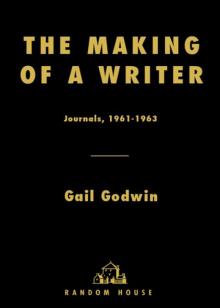 The Making of a Writer
The Making of a Writer The Making of a Writer, Volume 2
The Making of a Writer, Volume 2 Old Lovegood Girls
Old Lovegood Girls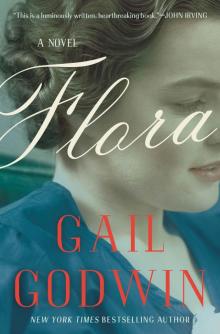 Flora
Flora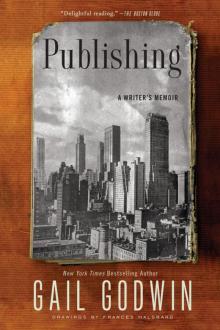 Publishing
Publishing The Finishing School
The Finishing School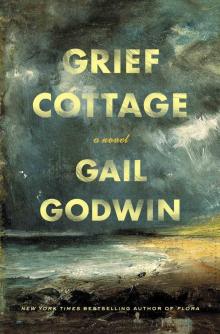 Grief Cottage
Grief Cottage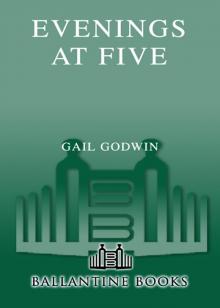 Evenings at Five
Evenings at Five Unfinished Desires
Unfinished Desires